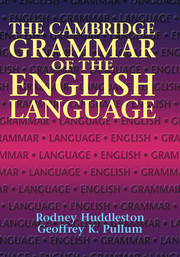Book contents
- Frontmatter
- Contents
- List of contributors
- Notational conventions
- Tree diagrams
- Preface
- 1 Preliminaries
- 2 Syntactic overview
- 3 The verb
- 4 The clause: complements
- 5 Nouns and noun phrases
- 6 Adjectives and adverbs
- 7 Prepositions and preposition phrases
- 8 The clause: adjuncts
- 9 Negation
- 10 Clause type and illocutionary force
- 11 Content clauses and reported speech
- 12 Relative constructions and unbounded dependencies
- 13 Comparative constructions
- 14 Non-finite and verbless clauses
- 15 Coordination and supplementation
- 16 Information packaging
- 17 Deixis and anaphora
- 18 Inflectional morphology and related matters
- 19 Lexical word-formation
- 20 Punctuation
- Further reading
- Index
- Lexical index
- Conceptual index
Preface
Published online by Cambridge University Press: 26 May 2017
- Frontmatter
- Contents
- List of contributors
- Notational conventions
- Tree diagrams
- Preface
- 1 Preliminaries
- 2 Syntactic overview
- 3 The verb
- 4 The clause: complements
- 5 Nouns and noun phrases
- 6 Adjectives and adverbs
- 7 Prepositions and preposition phrases
- 8 The clause: adjuncts
- 9 Negation
- 10 Clause type and illocutionary force
- 11 Content clauses and reported speech
- 12 Relative constructions and unbounded dependencies
- 13 Comparative constructions
- 14 Non-finite and verbless clauses
- 15 Coordination and supplementation
- 16 Information packaging
- 17 Deixis and anaphora
- 18 Inflectional morphology and related matters
- 19 Lexical word-formation
- 20 Punctuation
- Further reading
- Index
- Lexical index
- Conceptual index
Summary
This book aims to bridge the large gap that exists between traditional grammar and the partial descriptions of English grammar proposed by those working in the field of linguistics. We do not assume any familiarity with theoretical linguistics on the part of the reader and aim for as comprehensive a coverage as space allows, but we have made significant changes to the traditional analysis to take account of the progress that has been made by linguists in our understanding of English grammar.
The task of producing a new grammar of English that incorporates asmany as possible of the insights achieved in modern linguistics is too great for two people, and we are fortunate to have been able to enlist the help of a team of distinguished linguists. A grammar, however, requires a very high degree of integration between the parts, so that it would not have been possible simply to put together a collection of papers by different scholars writing within their area of specialisation. Instead, one or both of us have worked closely with the other contributors in co-authoring the chapters concerned: we are grateful to them for their willingness to engage in this somewhat unusual kind of collaboration. They are not of course to be held responsible for any shortcomings in the description relating to topics whose primary coverage is in other chapters than those that bear their names.
The lengthy business of producing this grammar has occupied one of us (RDH) for over a decade, most of it full-time, and the other (GKP) part-time for over six years. Naturally, many intellectual and personal debts have piled up during the lengthy process of research, consultation, collaboration, writing, revising, and editing. We cannot hope to convey the full extent of these debts, but we will attempt to sketch the outlines of those that are the most central.
The project has benefited from the support and advice provided by a group of eminent linguists who served as a Board of Consultants: Barry Blake, Bernard Comrie, Greville Corbett, Edward Finegan, John Lyons, Peter Matthews, Keith Mitchell, Frank Palmer, John Payne, Neil Smith, Roland Sussex, and the late James D. McCawley.
- Type
- Chapter
- Information
- The Cambridge Grammar of the English Language , pp. xv - xviiiPublisher: Cambridge University PressPrint publication year: 2002



